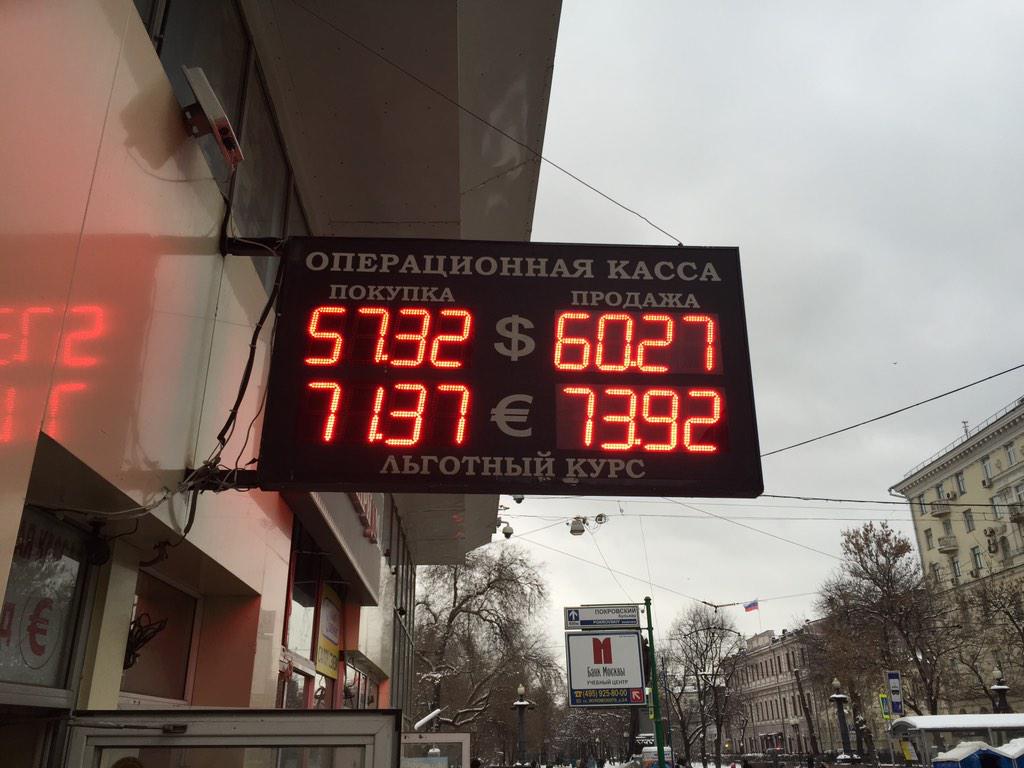By Peter Spence, Economics Correspondent

A dollar now costs Russians 60 rubles. The joke about 63 next year will have to be revised.
Tumbling oil prices and ongoing uncertainty over Ukraine have cast a long shadow over the Russian economy. As 2015 approaches, how much worse can it get?
Oil arguably brought an end to the old Soviet Union and once again the price of crude is proving to be a curse for the Kremlin.
The precipitous drop in oil prices recently has left Vladimir Putin’s Russia on the edge of economic ruin. The Kremlin has warned of a severe slowdown next year, with the economy entering a technical recession in the first quarter.
The year started badly for Russia after the Ukraine crisis boiled over and triggered capital flight and tough economic sanctions. Now a collapse in oil prices – down 45pc since June – has become primary cause of Russian pain. “This just looks ugly, period.” said Jonathan Anderson, of Emerging Advisors, in a recent note to clients.
Jacob Nell, of Morgan Stanley, said: “Since oil and gas account for 67pc of Russia’s exports and 50pc of federal budget revenues, oil prices drive the country’s economic cycle.”
The country was recently thought to be losing around $40bn [£25bn] per year due to sanctions and up to $100bn per year due to oil prices, according to the finance minister.
Russia’s rouble has also slumped, hitting many Russian consumers by pushing up inflation at a time when any hopes for growth are distant.
Some wealthier Russians have found ways to get around a combination of a tumbling currency and rising inflation, which the country’s central bank believes will reach 10pc by the end of the year.
While overall car sales fell by 1.1pc in November compared with the same month last year, demand for luxury vehicles rocketed, according to Association of European Businesses figures.
Sales of Porsche and Lexus cars rose by 55pc and 63pc respectively, as elites made bets on the automobiles as a way to maintain their wealth.
For others, the economy has become a joke, as much of Russia’s middle class has refused to lose its sense of humour – despite being unable to maintain a basic standard of living.
A gag website has been set up to display a dashboard of economic data - the rouble’s strength against the dollar and euro, and the price of oil - against a choice of soothing backdrops, accompanied with tranquil music.
Visitors are encouraged to “meditate indefinitely” in the hopes that their predicament will pass. The website's developer told one outlet that the page attracted more than 1.2m visitors in its first week.
The sanctions crippling Russia are expected to persist, and possibly intensify, unless the political situation in Ukraine is resolved.
When the first rounds of sanctions were discussed, oil prices stood at around $110 per barrel. The high cost of energy gave European countries little room to manoeuvre, as strong measures against Russia could have provoked the Kremlin into turning off supplies.
In recent days, however, oil has traded closer to $60, and a fall to as low as $50 would lead the rouble lower still.
Under such a scenario, Morgan Stanley estimates that inflation would increase by six to eight percentage points. Russia’s GDP would contract at an annual rate of 6pc – a harsh slowdown following on from years of near stagnation.
The Russian deficit may rise by five percentage points of GDP, but the prospect of a default remains remote.
Key corporates may be more vulnerable. The spread between financials and sovereign debt widened to record highs last week, suggesting that investors believe they are at greater risk of failing.
Economy watchers are now worried about what comes next.
Last week, Russia’s central bank raised its rates by another percentage point – to 10.5pc – in an attempt to stem outflows. Yet it appears to lack an arsenal capable of dealing with both soaring inflation and plunging growth.
Mr Putin has already promised to take “harsh” measures to fight currency traders, who he holds responsible for the rouble’s decline.
Speaking from the Grand Kremlin Palace in Moscow, he said: “The authorities know who these speculators are and the instruments we can use to influence them… the time has come to use these instruments”.
At the same time, he unveiled a tax amnesty on repatriation of capital, and a four-year freeze on corporate tax rates. Analysts do not expect either measure to have much of an impact.
To some, capital controls now seem an inevitable next step to try to halt outflows, which the Central Bank of Russia expects to hit $128bn this year, and $120bn in 2015.
Lars Christensen, of Danske Bank, said: "The central bank seems to be against such controls at the moment, but there are Kremlin advisors who are known to favour such draconian actions".
Once implemented, such controls can be hard to unwind – Iceland, for instance, has been unable to lift the ones it introduced during the financial crisis.
If Mr Putin’s hand is eventually forced in that direction, it will be a move of last resort.

No comments:
Post a Comment